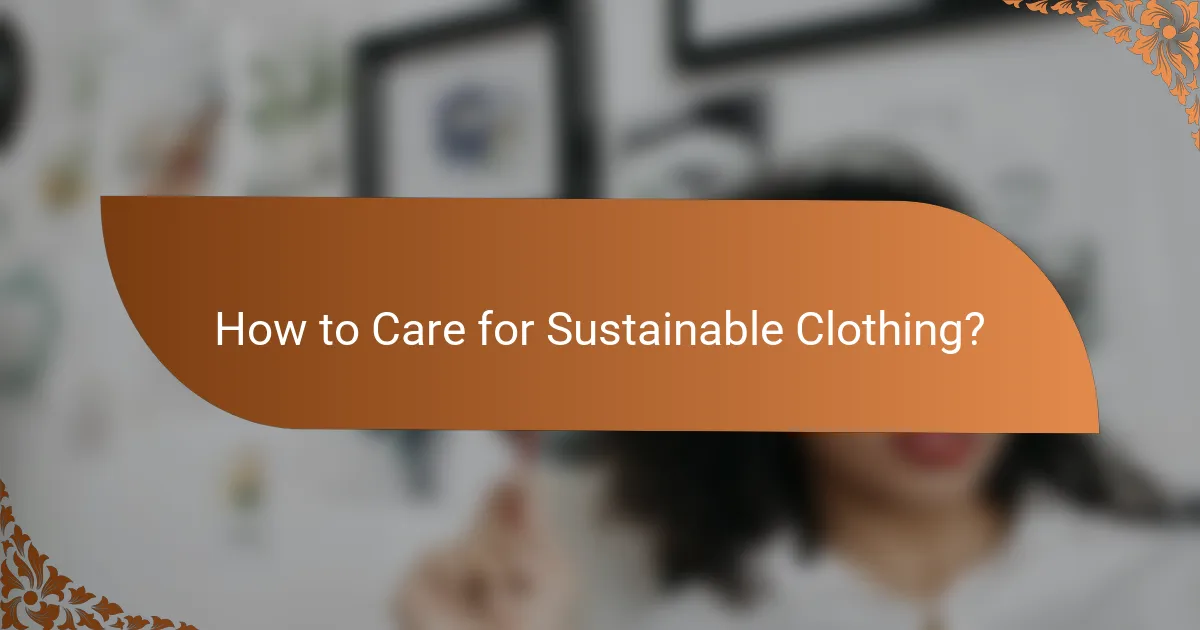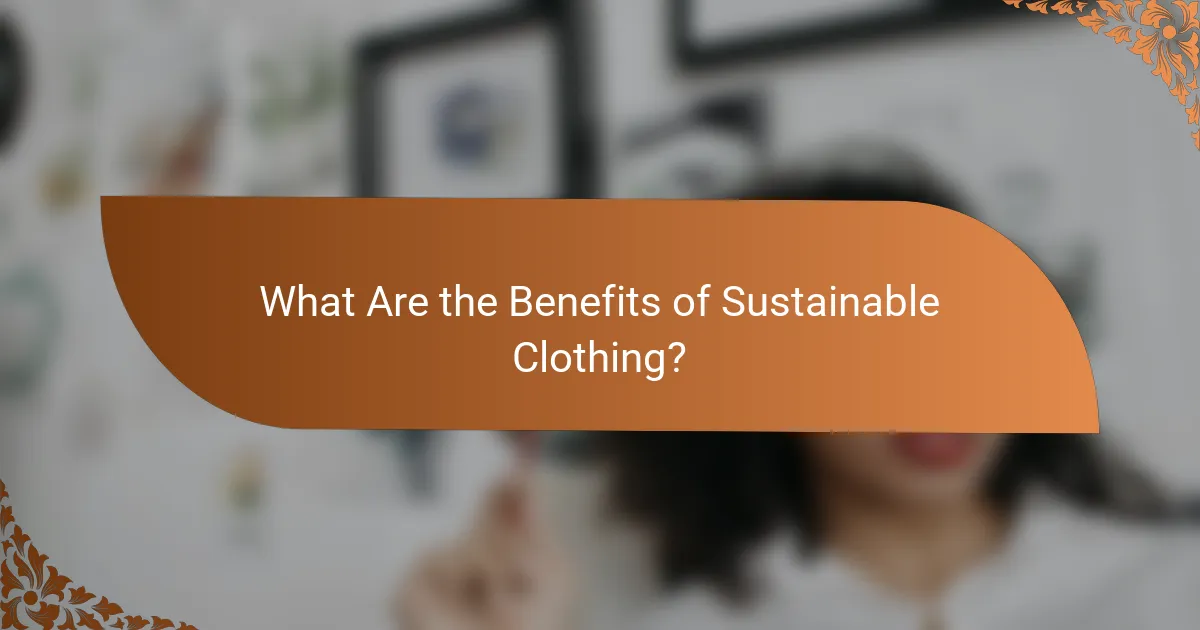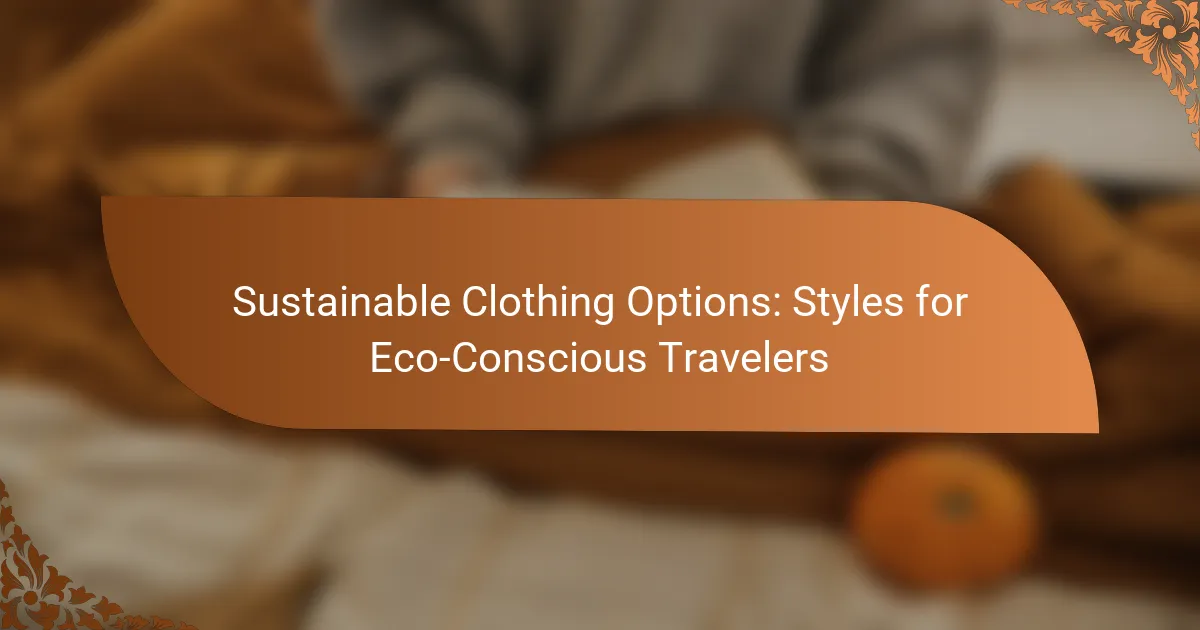For eco-conscious travelers, selecting sustainable clothing options is essential for minimizing environmental impact while enjoying stylish and functional attire. By choosing brands that prioritize eco-friendly materials and ethical production practices, you can ensure your wardrobe supports both your adventures and the planet. Look for versatile styles such as packable jackets and quick-dry activewear that offer comfort and practicality on the go.

What Are the Best Sustainable Clothing Brands for Travelers?
The best sustainable clothing brands for travelers focus on eco-friendly materials, ethical production practices, and durability. These brands help you minimize your environmental impact while ensuring you have stylish and functional clothing for your journeys.
Patagonia
Patagonia is renowned for its commitment to environmental sustainability and ethical manufacturing. The brand uses recycled materials and organic cotton, ensuring that its clothing is not only functional but also minimizes harm to the planet.
Travelers appreciate Patagonia’s durable outdoor gear, which includes jackets, pants, and base layers designed for various climates. Their Worn Wear program encourages customers to repair and recycle their clothing, extending the life of each piece.
Everlane
Everlane emphasizes transparency in its production processes, providing detailed information about the factories that produce its clothing. The brand offers a range of stylish basics made from sustainable materials like Tencel and recycled polyester.
For travelers, Everlane’s versatile pieces can easily transition from day to night, making them ideal for packing light. Their commitment to ethical practices and fair pricing also appeals to eco-conscious consumers.
Reformation
Reformation focuses on creating fashionable clothing while prioritizing sustainability. The brand uses eco-friendly fabrics and has a strong commitment to reducing waste throughout its supply chain.
Travelers can find a variety of dresses, tops, and activewear that are not only stylish but also made with a lower environmental footprint. Reformation’s commitment to sustainability is reflected in their carbon-neutral shipping and use of renewable energy.
tentree
tentree is dedicated to planting ten trees for every item sold, making it a unique brand in the sustainable clothing market. Their products are made from sustainable materials like organic cotton, recycled polyester, and Tencel.
For eco-conscious travelers, tentree offers comfortable and stylish clothing suitable for outdoor adventures. Their commitment to reforestation helps offset carbon emissions, making each purchase a step towards a greener planet.
Allbirds
Allbirds is known for its eco-friendly footwear and apparel made from natural materials such as merino wool and eucalyptus tree fibers. The brand emphasizes comfort and sustainability, appealing to travelers seeking lightweight and breathable options.
Allbirds’ shoes are perfect for long days of exploration, providing support while minimizing environmental impact. Their commitment to transparency and sustainability makes them a popular choice among eco-conscious consumers.

How to Choose Eco-Friendly Fabrics?
Choosing eco-friendly fabrics involves selecting materials that minimize environmental impact while providing comfort and durability. Look for certifications like GOTS for organic textiles and consider the lifecycle of the fabric, from production to disposal.
Organic Cotton
Organic cotton is grown without synthetic pesticides or fertilizers, making it a safer choice for the environment and farmers. When shopping, look for certifications such as GOTS or OEKO-TEX, which ensure the cotton meets strict ecological and social criteria.
While organic cotton can be more expensive than conventional cotton, its benefits include reduced water usage and a lower carbon footprint. Consider brands that prioritize sustainable practices in their production processes.
Hemp
Hemp is a highly sustainable fabric that requires minimal water and no pesticides to grow. It is known for its durability and breathability, making it ideal for various clothing styles, from casual wear to active apparel.
When selecting hemp clothing, check for blends with other eco-friendly materials to enhance comfort and versatility. Hemp fabrics can often be more expensive, but their longevity can justify the investment.
Tencel
Tencel, made from sustainably sourced wood pulp, is a biodegradable fabric that is soft and breathable. The production process uses a closed-loop system, which recycles water and solvents, reducing waste and environmental impact.
Look for Tencel garments labeled as Lenzing Tencel to ensure quality and sustainability. This fabric is ideal for travelers seeking lightweight, moisture-wicking clothing that is easy to pack and care for.
Recycled Polyester
Recycled polyester is made from post-consumer plastic bottles, diverting waste from landfills and reducing the need for virgin materials. This fabric is commonly used in activewear and outerwear due to its durability and moisture-wicking properties.
When choosing recycled polyester, seek out brands that disclose their recycling processes and environmental impact. While it offers a lower carbon footprint than new polyester, be mindful of potential microplastic shedding during washing.

What Styles Are Ideal for Eco-Conscious Travelers?
Eco-conscious travelers should prioritize clothing that combines sustainability with functionality. Key styles include packable jackets, versatile dresses, quick-dry activewear, and comfortable footwear, all designed to minimize environmental impact while maximizing comfort and practicality.
Packable Jackets
Packable jackets are essential for eco-conscious travelers, offering lightweight protection against the elements without taking up much space in your luggage. Look for options made from recycled materials or sustainable fabrics like organic cotton or Tencel.
When choosing a packable jacket, consider features such as water resistance, breathability, and packability. Brands often provide jackets that can be folded into their own pockets, making them easy to carry on hikes or city tours.
Versatile Dresses
Versatile dresses are a staple for eco-conscious travelers, as they can be dressed up or down for various occasions. Opt for dresses made from sustainable materials like hemp or recycled polyester, which are both eco-friendly and comfortable.
Choose styles that can transition from day to night, such as a simple sundress that can be paired with sandals for daytime adventures and dressed up with accessories for evening outings. This versatility helps reduce the number of items you need to pack.
Quick-Dry Activewear
Quick-dry activewear is ideal for travelers who engage in outdoor activities or need to wash clothes on the go. Fabrics like polyester and nylon often dry quickly and are lightweight, making them perfect for packing.
When selecting activewear, look for options that are moisture-wicking and breathable. This ensures comfort during physical activities while also allowing for easy washing and drying, reducing the need for multiple outfits during your trip.
Comfortable Footwear
Comfortable footwear is crucial for eco-conscious travelers, as it supports long days of exploration without compromising on style. Choose shoes made from sustainable materials, such as recycled rubber or organic cotton, that provide both comfort and durability.
Consider multi-functional shoes, like lightweight sneakers or sandals with arch support, that can be worn for various activities. Investing in quality footwear not only enhances your travel experience but also contributes to a more sustainable wardrobe.

How to Care for Sustainable Clothing?
Caring for sustainable clothing involves using methods that preserve the fabric while minimizing environmental impact. Proper washing and drying techniques can extend the life of these garments and maintain their eco-friendly qualities.
Washing Tips
When washing sustainable clothing, opt for cold water to save energy and reduce wear on the fabric. Use a gentle, eco-friendly detergent that is free from harsh chemicals to protect both the garment and the environment.
Avoid overloading the washing machine, as this can lead to inadequate cleaning and increased friction between garments. Instead, wash smaller loads to ensure each item receives proper care.
Consider air drying your clothes whenever possible, as this not only conserves energy but also helps maintain the integrity of the fabric. If you must use a dryer, select a low heat setting to minimize damage.
Drying Recommendations
Air drying is the best option for sustainable clothing, as it prevents shrinkage and fabric degradation. Hang items in a shaded area to avoid sun damage, which can fade colors and weaken fibers.
If using a dryer, remove clothes while they are still slightly damp to reduce drying time and prevent overheating. This practice can help maintain the shape and fit of your garments.
Be mindful of the care labels on your clothing, as some materials may have specific drying instructions. Following these guidelines ensures that your sustainable clothing remains in good condition for longer.

What Are the Benefits of Sustainable Clothing?
Sustainable clothing offers numerous advantages, including reduced environmental impact, improved ethical standards, and enhanced durability. By choosing eco-friendly materials and ethical production processes, travelers can support a healthier planet while enjoying high-quality apparel.
Environmental Impact
The environmental benefits of sustainable clothing are significant. These garments are often made from organic or recycled materials, which minimize waste and pollution. For instance, using organic cotton can reduce water consumption by up to 90% compared to conventional cotton.
Additionally, sustainable clothing brands typically employ eco-friendly manufacturing processes that lower carbon emissions. Supporting these brands helps decrease the overall environmental footprint of the fashion industry.
Ethical Production
Sustainable clothing often emphasizes fair labor practices and ethical production. Many brands ensure that workers receive fair wages and work in safe conditions. This commitment to ethical standards not only supports workers’ rights but also fosters a more equitable economy.
When selecting sustainable clothing, look for certifications such as Fair Trade or GOTS (Global Organic Textile Standard) to ensure that the products meet high ethical standards.
Durability and Longevity
One of the key benefits of sustainable clothing is its durability. These garments are typically designed to last longer than fast fashion items, which often wear out quickly. Investing in high-quality, sustainable pieces can save money in the long run, as they require less frequent replacement.
To maximize the lifespan of sustainable clothing, follow care instructions carefully and consider repairing items instead of discarding them. This practice not only extends the life of your wardrobe but also contributes to a more sustainable lifestyle.
